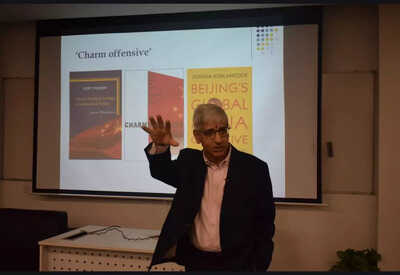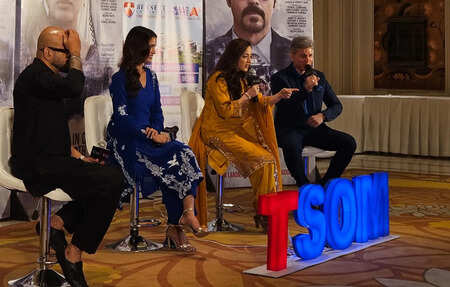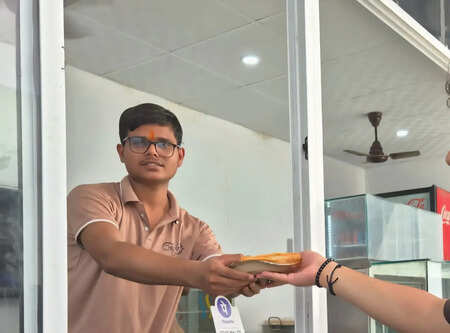'West controls global media to set pro-West sentiment'
Times of Bennett | Updated: Aug 29, 2024 23:22

By Aryamaan Jit Singh Bawa
Prof.Daya Thussu cited charm-offensive as China ’s way to spread the word of their society, customs and policies through global media “China spends 10 billion dollars annually on global communication , using charm offensive to spread their word they ensure they are heard from east to west ,” Prof. Daya said in a lecture at the Times School of Media , Bennett University (BU) on Wednesday while talking about how Chinese propaganda is closer to our shelves than we may think.
“Thewest controls global media through various outlets, they use this to control pro-west sentiment, but if we look to our east in nations like Bangladesh and Ethiopia, the narrative and agendas are widely opposing,” said Prof. Thussu while referring to a book he authored on the subject titled during his discussion on ‘Changing Geopolitics of Global Communication .
 (Prof. Thussu visits
(Prof. Thussu visits Bennett University to discuss geopolitics on a global scale with the students of the Times School of Media )
Being the President of the International Association for Media and Communication Research (IAMCR ), and having authored 5 books in the field, Prof, Thussu had unique takes on the eastern side of the globe with a special focus on China ’s standing in BRICS and the overall global scenario.
When discussing China’s possible soft shift from their existing socialist-communist model he said, “China has invented their own way to overtake the USA on the digital front. I believe they’ve softly adopted a cyber-capitalistic model which involves them creating exclusive versions of western software to be completely self-dependant, this gives them the control they need to orchestrate their narratives.”
The interactive discussion saw the students of the Times School of Media interact with Prof Thussu on topics ranging fromBRICS , NATO , Western ideology and China’s current standing in global communication and the concept of ‘Westlessness’.
During his discussion, he touched upon how the Western world, especially European countries worry about their stature in both the global economy and power in terms of decision-making. He cited the Munich Security Report 2020 and termed the concept “Westlessness”, he related this concept while referencing a book titled the same authored by Samir Puri, “China has now taken over USA’s international trade market, and this number has significantly grown on an annual basis,” he said to emphasize the current standing of China in global trade and politics.
Prof. Thussu gave credit to a concept he called ‘charm-offensive’ to spread the word of their society, customs and policies through global media “China spends 10 billion dollars annually on global communication, using charm offensive to spread their word they ensure they are heard from east to west,” he said when talking about how Chinesepropaganda is closer to our shelves than we may think.
Nearing the end of the discussion, Prof. Thussu emphasized the importance of think tanks, but highlighted their double-edged sword nature as well, “Whilst I agree that think tanks have become integral in global communication, they have also become drivers of agenda and mouthpieces of governments, in America, only 1 out of the top 15 most cited think tanks was not funded by the US defence department,” he said to back his point.
While discussing Chinese tactics in fields of modern global communication, he deviated the topic to the housing market crash in 2008, a market crash so immense that it was felt around all latitudes and longitudes, “China saw the market crash as their golden opportunity to grab power, they began a new strategy on the pretext of connectivity and assistance, and a decade and a half later we now know this as the biggest infrastructure project in history, the belt and road initiative.”
Prof. Thussu’s fruitful discussion had students filled with introspective questions and deep insights in regard to today’s media climate. This session is a testament to the Times School of Media’s drive to get their students the best exposure and networking as possible to uphold their responsibility as exceptional media educators.
(The writer is a Semester V student of the BA (Journalism and Mass Communication) programme)
Prof.
“The

Being the President of the International Association for Media and Communication Research (
When discussing China’s possible soft shift from their existing socialist-communist model he said, “China has invented their own way to overtake the USA on the digital front. I believe they’ve softly adopted a cyber-capitalistic model which involves them creating exclusive versions of western software to be completely self-dependant, this gives them the control they need to orchestrate their narratives.”
The interactive discussion saw the students of the Times School of Media interact with Prof Thussu on topics ranging from
During his discussion, he touched upon how the Western world, especially European countries worry about their stature in both the global economy and power in terms of decision-making. He cited the Munich Security Report 2020 and termed the concept “Westlessness”, he related this concept while referencing a book titled the same authored by Samir Puri, “China has now taken over USA’s international trade market, and this number has significantly grown on an annual basis,” he said to emphasize the current standing of China in global trade and politics.
Prof. Thussu gave credit to a concept he called ‘charm-offensive’ to spread the word of their society, customs and policies through global media “China spends 10 billion dollars annually on global communication, using charm offensive to spread their word they ensure they are heard from east to west,” he said when talking about how Chinese
Nearing the end of the discussion, Prof. Thussu emphasized the importance of think tanks, but highlighted their double-edged sword nature as well, “Whilst I agree that think tanks have become integral in global communication, they have also become drivers of agenda and mouthpieces of governments, in America, only 1 out of the top 15 most cited think tanks was not funded by the US defence department,” he said to back his point.
While discussing Chinese tactics in fields of modern global communication, he deviated the topic to the housing market crash in 2008, a market crash so immense that it was felt around all latitudes and longitudes, “China saw the market crash as their golden opportunity to grab power, they began a new strategy on the pretext of connectivity and assistance, and a decade and a half later we now know this as the biggest infrastructure project in history, the belt and road initiative.”
Prof. Thussu’s fruitful discussion had students filled with introspective questions and deep insights in regard to today’s media climate. This session is a testament to the Times School of Media’s drive to get their students the best exposure and networking as possible to uphold their responsibility as exceptional media educators.
(The writer is a Semester V student of the BA (Journalism and Mass Communication) programme)







